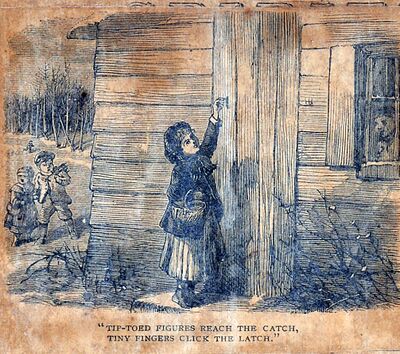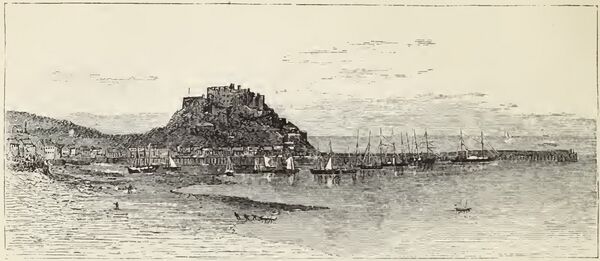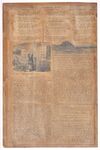The Ruined Cottage
At night-fall, coming through the wood, A.F. |

“Tip-Toed Figures Reach the Catch, |

Irdhi-Pada
When, of late years, within a period most of us can remember, the phenomena of Spiritualism became more widely known, few of the manifestations provoked more popular surprise and incredulity than the sudden loosening of tightly-knotted bonds, and levitation, or the floating of human bodies above the ground. Both have now passed into the common-places of the movement. In a past number of this paper an instance was adduced, showing that the instantaneous untying of cords was known long ago in India ; it is now proposed to bring forward some details showing that in very remote antiquity, centuries before our era, the idea of levitation was a familiar indication and accompaniment of the highest state of spiritual exaltation.
In the prodigiously complicated system of Buddhist rites and asceticism, it was believed possible by the continuous observance of certain ceremonies, and an inflexibly followed course of moral action, to arrive at the possession of supernatural powers. The entrance on this course was through the rite called Kasina, of which there were ten descriptions, chiefly modes, assisted by material symbols, of persisting in rigid, unbroken meditation, till the state called samadhi was induced. Samadhi is described as that which keeps the thoughts together, like the moisture which causes the grains of sand to adhere together and form a ball ; through this the illumination termed nimitta was attained. The ten Kasinas were to be exercised in fourteen excessively complicated ways, and after all had been successfully accomplished, the power of Irdhi might be acquired, though not infallibly. Irdhi is a miraculous power distinguishing a Rahat, or one who is entirely free from evil desire ; who has passed the four paths, and will at death attain Nirwana. One special characteristic of Irdhi is the power of instant locomotion and flight through the air from place to place ; hence it is called Irdhi-pada, i. e., the Divine Foot, on account of the assistance it renders to those who possess it. Fah-Hian, the Chinese pilgrim to India in the 4th century, the accuracy of whose local and geographical accounts has been so fully confirmed, observes, in a matter-of-course way, as though it were nothing unusual, that “Rahats continually fly ;” and again,—
“The men of that country frequently see persons come flying to the temple (apparently Ellora) ; the religious men occupying the upper chambers are constantly on the wing.” (Beal's Travels of Fah-Hian.)
People to-day are staggered at the accounts of mediums floating up to ceilings, or being transported in a moment from one quarter of London to another ; and few, perhaps of the boldest would be prepared to imagine flights of holy men fluttering like pigeons about the high chamber-cells of rock-temples ; but there are strange things in the world to-day, and there may have been stranger in days gone by than dreamt of in any philosophy. At Dardu, in Northern India, the same pilgrim saw an image of wood ninety-four feet high, representing Maitreya Bodhisatwa, “the Buddha that is yet to be,” to obtain the size and appearance of which a sculptor was by the power of Irdhi three times transported up to the Tushita heaven, the Fourth Sphere wherein rest all births yet to come. This calls to mind that weird man, known to St. Paul, who was caught up to the third heaven and heard unspeakable words (2 Cor. xii). May he not have been an Indian ascetic? This ; power is described as a miraculous energy of the purified will, gradually prepared by the long and difficult processes previously spoken of, as the potter gradually prepares and tempers his clay for any vessels he designs.
Malinda, the king of Sagal, asked the great Buddhist sage Nagasena on this point,—
“Can any one who has the fleshly body of a man pass instantly to other countries, or to the worlds of the gods and Brahmas ?”
Nagasena. “It is possible for one who has a body composed of the four elements, to visit the places you have named.”
Milinda. “In what way can this be done ?”
N. “Can you, at your will, leap from the ground, say, to the height of a span ora cubit ?”
M. “With ease I can leap eight cubits high.”
N. “How do you do this ?”
M. “I determine to leap ; through this determination my body becomes as it were buoyant, and I rise from the ground.”
N. “Just so the priest who has power of Irdhi determines to go to such a place ; by the determination of his mind, his body becomes as it were imponderous, and he is enabled thereby to pass through the air.”
It is well known how essential force of will is in mesmerism. But besides the power of passing through the air Irdhi confers the power of self-multiplication, of seeing in any place as with divine eyes, even into rocks and earth, of causing a wind to arise, of making any substance remove from one place to another without the intervention of a second person, of causing things to appear that are lost or hidden, of suddenly producing various objects, such as utensils, flowers and gems ; and of passing through walls and solid substances. It is also the privilege of those who have entered into any of the four paths to discern the thoughts and the previous lives of all in the same or the preceding paths. <... continues on page 3-80 >
Editor's notes
- ↑ The Ruined Cottage by A.F., Harper's New Monthly Magazine, vol. 51, June to November 1875, p. 51. Original text on Archive.org
- ↑ Tip-Toed Figures Reach the Catch, Tiny Fingers Click the Latch by unknown author
- ↑ Mount Orgueil Castle, Jersey by unknown author, Harper's New Monthly Magazine, vol. 51, June to November 1875, p.8. Bay with many sailers
- ↑ Irdhi-Pada by unknown author. From the London Spiritualist

